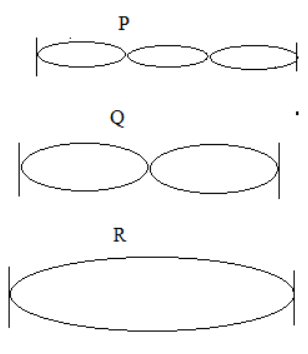Question
Question: The adjacent diagram shows three different modes of vibrations of P, Q and R of the same string. W...
The adjacent diagram shows three different modes of vibrations of P, Q and R of the same string.
Which vibrations will produce a louder sound and why?

Solution
Hint: This question is based on the power and intensity of the sound wave. First of all, we will see the definition and formula for power and intensity of sound waves. After this we will define the term sound level which is measured in terms of decibels and quantify the loudness of sound.
Complete answer:
The formula for average power of a sound wave is given by:
Pav=2ρvA(△pm)2 where:
A is the cross sectional area of fluid element through which sound travels.
△pm is the amplitude of a sound wave.
ρ is the density of medium.
V is the speed of sound through the medium.
When we are comparing the sound , it is more useful to define the term intensity of sound wave.
Intensity of the wave is defined as average power per unit area. Therefore, the intensity of sound wave is given by:
I =APav=2ρv(△pm)2.
The response of the ear to the sound of increasing intensity is nearly logarithmic. So, it is convenient to define the term sound level.
Sound level(SL)=10logI0I. I0 is the reference intensity which is equal to 10−12w/m2. It is measured in terms of decibels(dB).
Loudness of sound is nothing but sound level which further depends on the intensity of sound wave.
We know from the formula of intensity of sound waves that it is directly proportional to square of amplitude of wave.
So, the loudness of sound is also dependent on the amplitude of the wave.
More is amplitude ⇒ Louder is the sound.
So, from the wave given, R has maximum amplitude. Therefore, it has maximum loudness.
Note- A sound of intensity I0has a sound level of 0dB. The threshold of pain of human hearing has a sound level of 120dB. Loudness of sound depends on amplitude of the wave whereas the pitch of the sound depends on the frequency of the wave. Therefore, P has maximum pitch.
